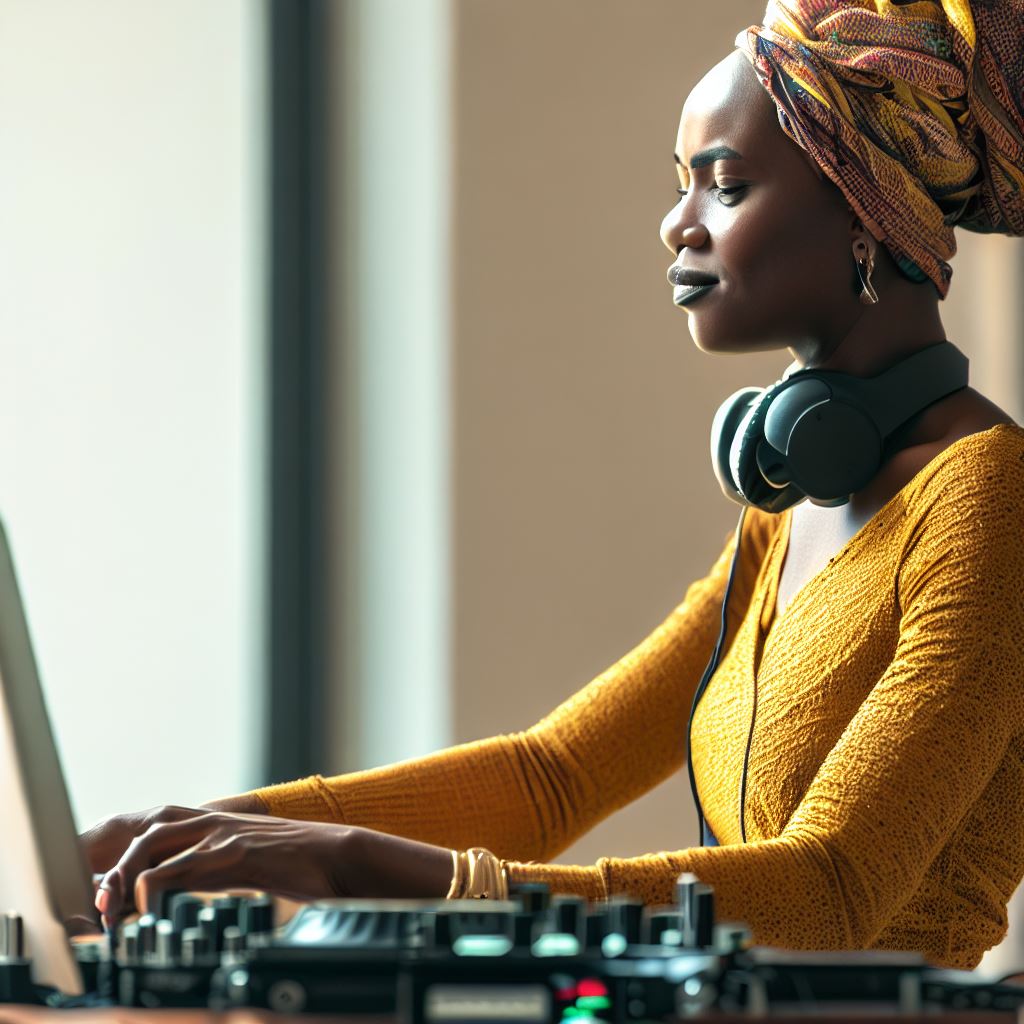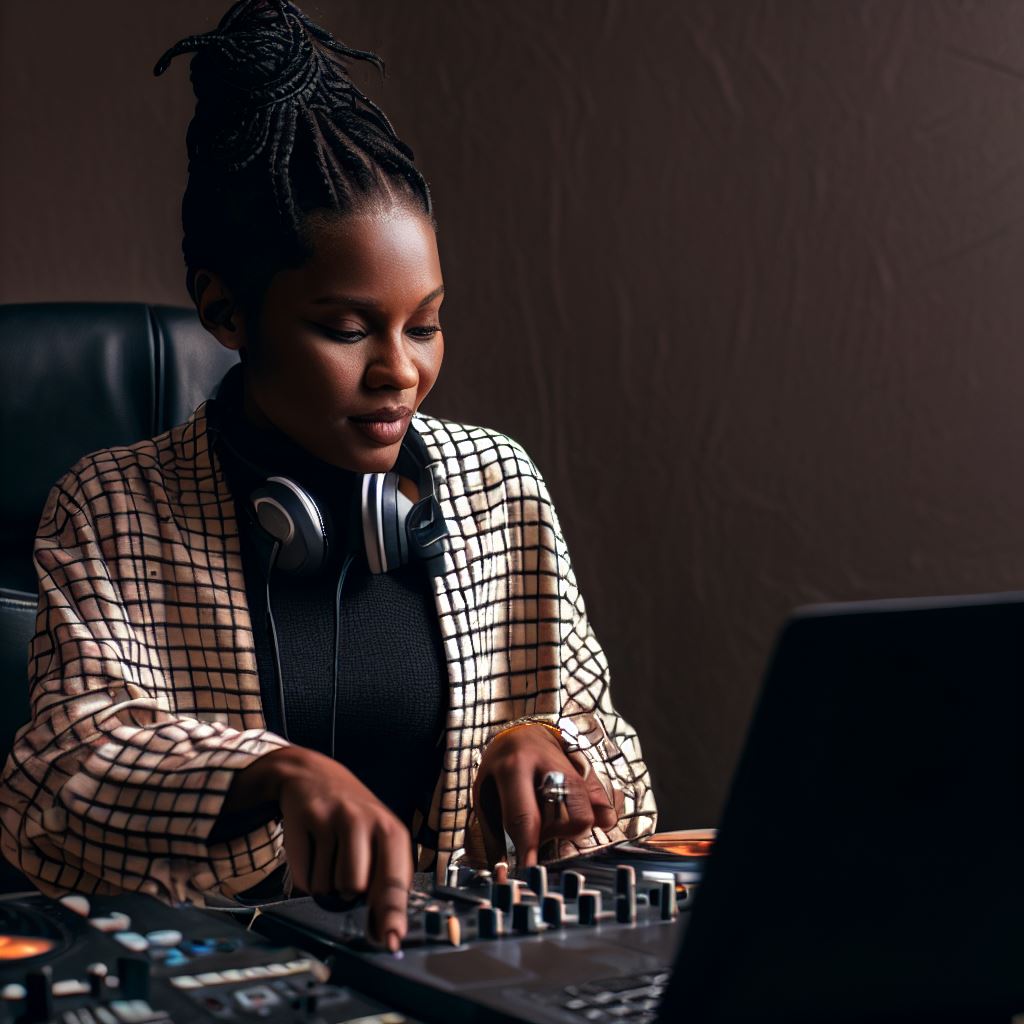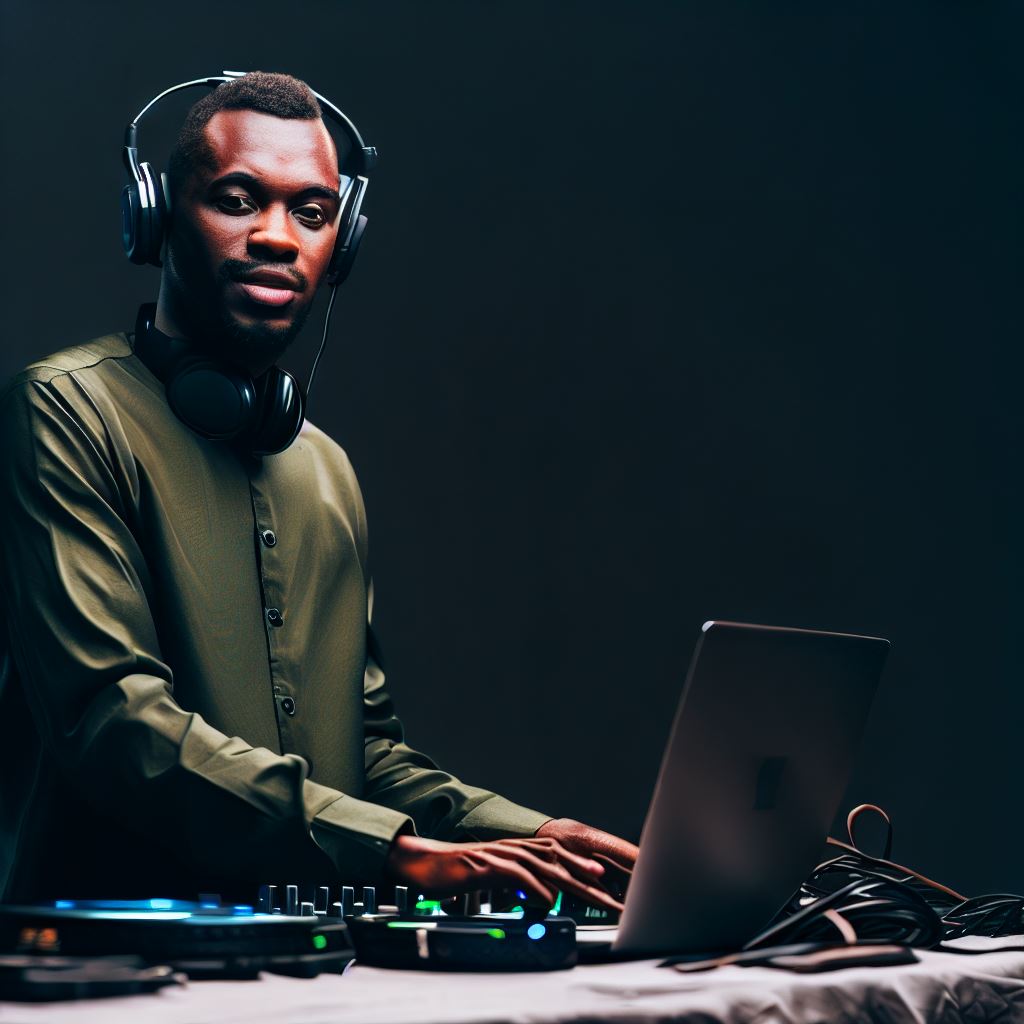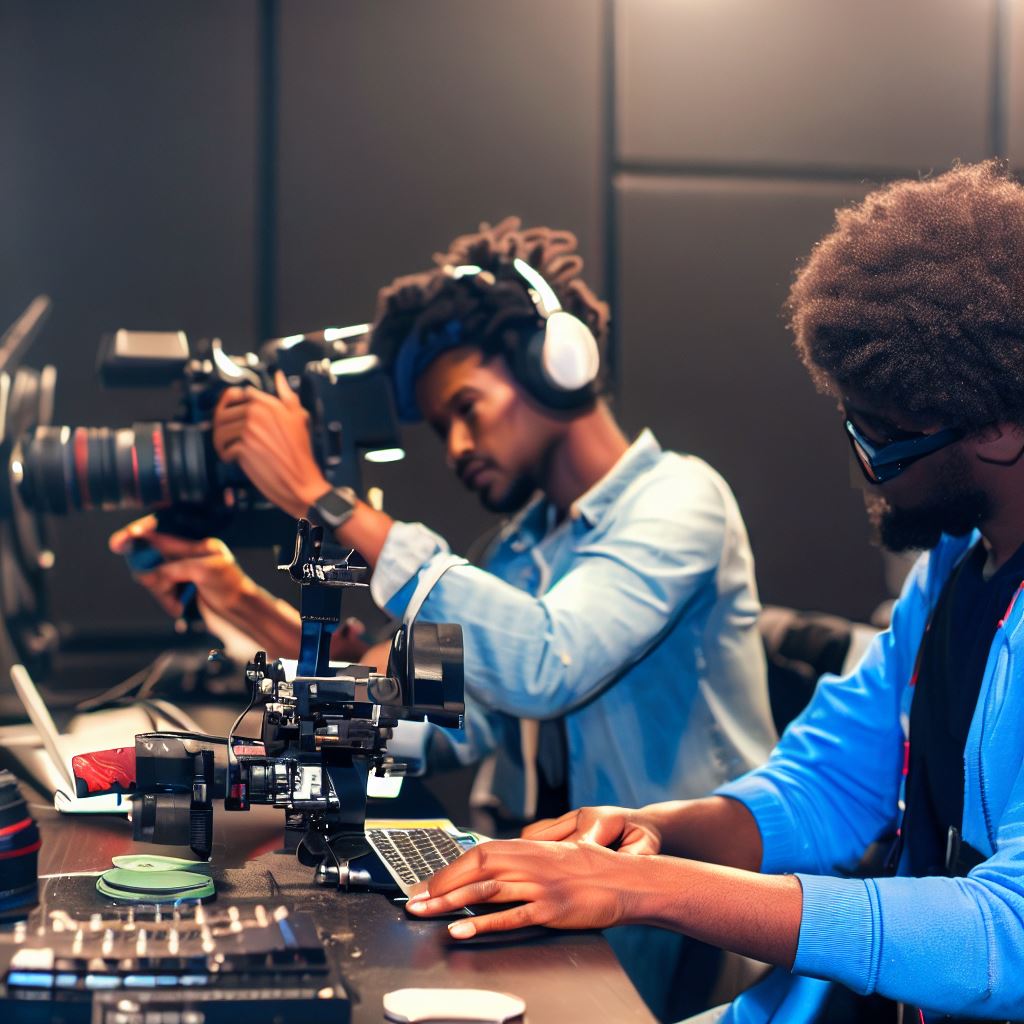Introduction
Brief explanation of DJing
DJing is the art of mixing and playing recorded music for an audience.
Importance of understanding the legal aspects of DJing in Nigeria
Understanding the legal aspects of DJing in Nigeria is crucial to avoid legal issues.
Overview of what the blog post will cover
This blog post will cover the legal requirements, copyright issues, and performance license.
Brief explanation of DJing
- DJing is an art form.
- Mixing and playing music.
- Energizing events and parties.
- Creativity and skill combined.
Importance of understanding the legal aspects of DJing in Nigeria
- Legal knowledge protects DJs.
- Ensures compliance with laws.
- Avoids copyright infringement.
- Safeguards intellectual property.
- Prevents legal hassles.
Overview of what the blog post will cover
- DJing’s essence and evolution.
- Copyright laws and music licensing.
- Equipment and noise regulations.
- Contract and gig considerations.
- DJing in the digital age.
- Protecting your DJ brand.
- This blog empowers DJs.
Copyright and Intellectual Property Laws
Explanation of copyright laws in Nigeria
- In Nigeria, copyright laws protect original creative works such as music, art, literature, and more.
- These laws grant exclusive rights to the creators and owners of these works.
- The Nigerian Copyright Commission (NCC) is the government agency responsible for enforcing these laws.
How it applies to DJing and music selection
- As a DJ, it is important to understand that playing copyrighted music without permission is illegal.
- This applies to both live performances and recorded mixes.
- When selecting music for your DJ sets, you must ensure that you have the necessary licenses or permissions.
Consequences of copyright infringement
- Engaging in copyright infringement can lead to serious consequences for DJs in Nigeria.
- You may face legal action, including hefty fines and even imprisonment.
- Your reputation as a DJ can also be severely damaged, affecting your career prospects.
Tips on avoiding copyright issues
- To avoid copyright issues, it is essential to use legal sources for acquiring music.
- Purchase music from authorized platforms or obtain licenses from the respective copyright owners.
- Consider joining music licensing organizations like the Performing Musicians Employers’ Association of Nigeria (PMAN).
- When creating mixes, seek permission from the artists, labels, or rights holders to use their copyrighted materials.
By respecting and adhering to copyright and intellectual property laws, DJs in Nigeria can ensure a successful and sustainable career.
Remember, the creative work of others deserves protection, and obtaining the necessary permissions demonstrates professionalism and respect for the industry.
Stay legal, stay responsible, and keep the music flowing!
Read: Prominent Nigerian DJ Agencies and How to Join Them
Licensing and Permits
Importance of obtaining necessary licenses and permits
- Djing in Nigeria requires DJs to obtain the necessary licenses and permits.
- Proper licensing ensures legality and legitimacy of DJ performances.
- Obtaining licenses and permits builds trust with event organizers and clients.
- It shows professionalism and adherence to legal requirements in the DJ industry.
- Failure to obtain licenses and permits may result in legal complications and penalties.
Different types of licenses required for DJing in Nigeria
- Copyright License: DJs need a license to play copyrighted music in their performances.
- Performing Rights License: Obtain a license from the appropriate Performing Rights Organization (PRO).
- Public Performance License: Required for playing music in public spaces like clubs, events, or venues.
- Sound Recording License: Obtained from the Nigerian Copyright Commission to legally use recorded music.
- Public Address License: Required if DJ sets involve the use of public address systems.
- ENL License: DJs playing in establishments with dancing or entertainment spaces need this license.
How to obtain licenses and permits
- Contact the Nigerian Copyright Commission or relevant bodies to inquire about the necessary licenses.
- Fill out the required application forms and provide all the requested documents.
- Pay the necessary fees for the different licenses and permits.
- Undergo any required training or examinations related to DJ licensing.
- Ensure compliance with all regulations and guidelines provided by the licensing authorities.
- Renew licenses and permits periodically to maintain legal status.
Consequences of performing without proper licensing
- Legal issues may arise, leading to lawsuits, fines, and damage to the DJ’s reputation.
- The DJ may face penalties, including the confiscation of equipment or suspension of performances.
- Event organizers and venues may refuse to hire DJs without proper licensing.
- Clients and customers may lose trust and confidence in the DJ’s professionalism and reliability.
- Performing without proper licensing undermines the integrity of the DJ industry in Nigeria.
It is crucial for DJs in Nigeria to understand the importance of licensing and permits in their profession.
Obtaining the necessary licenses not only ensures legal compliance but also fosters trust and professionalism in the industry.
Failure to obtain proper licensing can lead to severe consequences, including legal complications, penalties, and a damaged reputation.
DJs should take the time to familiarize themselves with the different types of licenses they may need and follow the necessary steps to obtain them.
By doing so, DJs can demonstrate their commitment to operating within the legal framework and contribute to a thriving DJing community in Nigeria.
Read: Nightlife in Nigeria: The Essential Role of Club DJs
Contracts and Agreements
The significance of having written contracts
- Protects both parties involved in the DJing transaction.
- Serves as legal evidence in case of any disputes or disagreements.
- Provides clarity and prevents misunderstandings between the DJ and the client.
- Safeguards the DJ’s rights and ensures proper payment and compensation.
- Establishes the scope of work, expectations, and obligations for both parties.
Overview of the common clauses in DJ contracts
- Performance details: specifies the date, time, and duration of the DJ’s services.
- Compensation: states the fee or payment terms for the DJ’s performance.
- Deposit and cancellation policy: outlines the guidelines and penalties for cancellations.
- Equipment and setup requirements: defines the DJ’s equipment needs and venue arrangements.
- Liability and indemnity: clarifies each party’s responsibility for any damages or injuries.
Tips for negotiating and drafting DJ contracts
- Research and use a standard DJ contract template as a starting point.
- Customize the contract to meet the specific needs and requirements of the event.
- Clearly define the DJ’s role, responsibilities, and limitations.
- Include provisions for any additional services or expenses that may arise.
- Set deadlines for signing the contract and submitting any necessary documentation or payments.
Importance of understanding the terms and conditions before signing
- Review the contract thoroughly to avoid any surprises or misunderstandings later on.
- Ensure clarity and accuracy in the contract’s language and terms.
- Seek legal advice if there are any aspects of the contract that are unclear or concerning.
- Address any concerns or negotiate changes with the client or DJ before signing.
- Keep a copy of the signed contract for future reference and protection if issues arise.
Read: Spotlight on Female DJs: Breaking Barriers in Nigeria

Performance Rights Organizations (PROs)
Explanation of PROs and their role in music licensing
- Performance Rights Organizations (PROs) are entities responsible for administering and licensing public performance rights for musical works.
- They ensure that songwriters and music publishers receive royalties when their music is publicly performed.
- PROs play a crucial role in protecting the rights and interests of songwriters and music creators.
- They negotiate licenses with various businesses and venues, ensuring that the music being played is properly licensed and that the creators are compensated for their work.
List of prominent PROs in Nigeria
In Nigeria, there are several prominent PROs that operate to protect the interests of music creators and ensure fair compensation. Some of these PROs include:
- Copyright Society of Nigeria (COSON)
- Performing Musicians Employers’ Association of Nigeria (PMAN)
- Musical Copyright Society Nigeria Limited (MCSN)
- Nigerian Copyright Commission (NCC)
Benefits of joining a PRO as a DJ
Joining a PRO as a DJ can provide numerous benefits.
- Firstly, it ensures that you are legally protected when you play music in public settings.
- By being a member, you have the necessary licenses and permissions to play copyrighted works, avoiding potential legal issues.
- Secondly, being part of a PRO allows you to access a vast catalog of music legally.
- PROs have agreements with various music publishers, giving you the freedom to explore and play a wide range of music without worrying about infringement.
- Additionally, joining a PRO opens up opportunities for networking and collaboration with other music industry professionals.
- It creates a platform for you to connect with artists, songwriters, and producers, potentially leading to future collaborations and career advancements.
How PROs distribute royalties to DJs
- PROs collect royalties through various means, including licensing fees from businesses and venues, as well as digital streaming platforms.
- Once the royalties are collected, the PROs distribute the funds to their registered members, including DJs.
- The distribution of royalties takes into account the frequency of use and popularity of the music.
- PROs use complex algorithms and data analysis to determine the proportionate share of royalties that each member should receive.
- DJs who are members of a PRO are required to submit setlists or playlists of the music they played during their performances.
- This information helps PROs accurately track and distribute royalties to the appropriate songwriters and music publishers.
All in all, joining a Performance Rights Organization as a DJ in Nigeria can have significant benefits. It ensures legal protection, grants access to a wide catalog of music, and creates networking opportunities.
Furthermore, through the distribution of royalties, PROs contribute to the fair compensation of music creators in Nigeria’s vibrant DJing industry.
Read: Digital vs Vinyl: The DJing Landscape in Nigeria Today
Venue Regulations and Noise Restrictions
Understanding venue regulations for DJ performances
- Venue regulations are rules and guidelines that must be followed when performing as a DJ.
- These regulations can vary from venue to venue and must be thoroughly understood.
- Some common regulations include set duration, start and end times, and equipment limitations.
- It is essential to communicate with the venue management to clarify any uncertainties.
- Complying with venue regulations is crucial for maintaining a good reputation as a DJ.
Common noise restrictions and how to comply
- Noise restrictions are imposed to maintain a peaceful environment for neighboring establishments or residences.
- DB limits are often set, and it is important to have equipment that can measure and control sound levels.
- Positioning speakers correctly and using soundproofing materials can help reduce noise levels.
- Abiding by these restrictions shows professionalism and respect for the community.
- Regularly checking local noise regulations ensures compliance and avoids unnecessary penalties.
Tips for dealing with noise complaints
- Despite precautions, DJs may still receive noise complaints from attendees or nearby residents.
- Address complaints politely, apologize if necessary, and assure them that you will take appropriate action.
- Offering solutions like adjusting speaker positions or soundproofing can help resolve the issue.
- Escalate complaints to venue management if necessary and work together to find a suitable resolution.
- Handling noise complaints professionally strengthens your reputation as a responsible DJ.
Consequences for violating venue regulations
- Violating venue regulations can have severe consequences for a DJ.
- Penalties may range from warnings or fines to being banned from future performances.
- Legal action can be taken by the venue or affected parties, resulting in financial and reputational damage.
- Avoiding violations by thoroughly understanding and adhering to regulations is crucial.
- Maintaining a positive relationship with venues ensures future opportunities for DJ performances.
Read: Influence of Nigerian DJs in Promoting Local Talents
Tax Obligations for DJs
Overview of tax obligations for DJs in Nigeria
- DJs in Nigeria are required to comply with certain tax obligations imposed by the government.
- These obligations are important to ensure DJs contribute their fair share towards the development of the country.
- Failure to meet these obligations can result in penalties, fines, and even legal consequences.
- It is crucial for DJs to understand and fulfill their tax obligations to avoid any complications.
Different types of taxes DJs may be liable for
- Income Tax: DJs are required to pay income tax on their earnings generated from their DJing services.
- Value Added Tax (VAT): DJs may also need to register for VAT if their annual turnover exceeds a certain threshold.
- Withholding Tax: DJs who have employees or contractors must deduct withholding tax from their payments and remit it to the government.
- Pay As You Earn (PAYE): If a DJ employs staff, they need to register for PAYE and deduct income tax from their employees’ salaries.
How to stay compliant with tax laws
- Consult with a qualified tax professional to understand your specific tax obligations as a DJ.
- Keep accurate records of your income and expenses related to your DJing services.
- Register with the appropriate tax authorities and obtain the necessary tax identification numbers.
- File your tax returns on time and pay any taxes owed by the specified due dates.
- Regularly stay updated on changes in tax laws that may affect your obligations as a DJ.
Benefits of properly handling tax obligations
- Avoidance of Penalties: Fulfilling your tax obligations prevents you from incurring penalties, fines, and legal repercussions.
- Public Image: Being compliant with tax laws enhances your reputation as a professional and responsible DJ.
- Peace of Mind: Properly handling tax obligations allows you to focus on your DJing career without unnecessary stress or distractions.
- Avoiding Audits: By accurately reporting your income and paying your taxes, you are less likely to be subjected to tax audits.
- Contributing to Development: Paying your taxes helps fund essential public services and contributes to the overall development of Nigeria.
In short, DJs in Nigeria have certain tax obligations that they must fulfill to comply with the law. These include income tax, VAT, withholding tax, and PAYE.
Staying compliant with tax laws not only avoids penalties but also enhances your professional image, provides peace of mind, and contributes to the development of the country.
Consulting with tax professionals and maintaining accurate records are crucial steps in meeting your tax obligations as a DJ. Stay informed about any changes in tax laws to ensure continued compliance.
Read: The Impact of Nigerian DJs on the Global Music Scene
Conclusion
Recap of the main legal aspects of DJing in Nigeria
DJing in Nigeria comes with various legal aspects that DJs need to be aware of.
These include obtaining necessary licenses, such as copyright and performance rights licenses, and adhering to laws surrounding music piracy.
Importance of being informed and acting in accordance with the law
It is crucial for DJs in Nigeria to stay informed about the legal requirements and regulations in order to avoid legal issues and protect their careers.
Acting in accordance with the law not only ensures compliance but also fosters a positive image in the industry.
Final thoughts and call-to-action for DJs in Nigeria
- Lastly, DJs in Nigeria should prioritize understanding the legal aspects of their craft and take proactive steps to comply with the law.
- This includes obtaining necessary licenses, respecting copyright laws, and promoting legal streaming platforms.
- By doing so, DJs can contribute to the growth and development of the Nigerian music industry while safeguarding their own professional reputation.
Let’s strive for a thriving and legal DJing community in Nigeria!




